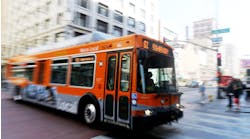Mar. 20—SEPTA has abandoned, amid a surge in violent crime, an artificial intelligence surveillance program meant to detect guns on the transit system.
After a year of testing the program, SEPTA officials in December ended a contract with ZeroEyes, the company that operates the eponymous AI gun detection video analytics program, said Andrew Busch, spokesperson for SEPTA. The transit agency, according to Busch, decided to end its ZeroEyes pilot program because the software was incompatible with SEPTA's analog security camera system, and as part of a larger effort to boost staffing in its police department.
"We do think it's a very good technology," said Busch. "But for what SEPTA police need right now, we don't think it's the right fit."
SEPTA's decision to end its contract with ZeroEyes was first reported by the Trace.
Sam Alaimo, ZeroEyes' chief revenue officer and co-founder, said SEPTA's "quite old" cameras could not serve a system designed for today's digital cameras.
"It's hard to make a new AI-based algorithm work on archaic technology," Alaimo said.
SEPTA pulled the plug on ZeroEyes at the end of the worst year for murders along the transit system since 2020, with six murders reported on SEPTA in 2023, according to agency data. Those 12 months also saw 108 aggravated assaults reported, down slightly from 2022 when there were 111.
The new year did not bring an end to the bloodshed. Earlier this month, 15 people — including eight Northeast High School students — were shot over the course of four days on or near SEPTA properties or vehicles, and two of those people were killed, one of them a high school student.
The AI gun detection video analytics program is used in 40 states and has been used by the U.S. Department of Defense and school districts across the country, a ZeroEyes spokesperson said. A $63,000, six-month pilot was approved by the SEPTA board in November 2022 and was extended another six months, said Busch. Funding for the pilot came from the agency's operating budget.
After officials extended SEPTA's contract with ZeroEyes for another six months into last December, they made the decision not to go forward with the program due to continuing use of the software and any expansion requiring upgrades to SEPTA's aging cameras, said Busch.
How ZeroEyes software works
At the time of its rollout, ZeroEyes CEO and cofounder Mike Lahiff said the program was a tool to help Philadelphia combat rampant gun violence.
The program was meant to layer its software over SEPTA's existing security cameras, enabling AI to identify guns and alert local law enforcement within three to five seconds of detection, a SEPTA spokesperson said. Former military and law enforcement specialists were to monitor and verify every detection from ZeroEyes' operations center, the spokesperson said.
The monitors would identify details of the person wielding the gun, including what they look like, what they're wearing, the type of weapon, and their real-time location, the agency spokesperson said.
ZeroEyes software was installed on 300 of SEPTA's 31,000 security cameras — slightly under 10% of the system, according to Busch. The ZeroEyes-connected cameras were spread out across the sprawling transit system, covering most of the Market-Frankford and Broad Street lines' stations.
It is unclear how many arrests were made because of ZeroEyes. What ZeroEyes' representatives did see was that the software was no match for SEPTA's outdated technology.
"That was a problem we ran into with the SEPTA infrastructure," said Alaimo. "And it was to such an extent that SEPTA wasn't satisfied with the efficacy of the software running on analog cameras and neither were we."
SEPTA aims to boost police presence
SEPTA now aims to spend the $4.9 million state grant SEPTA earmarked for ZeroEyes on other security needs. The agency last week submitted a modified application to the commission to reallocate the funds, with $2 million going to upgrade aging camera systems, $500,000 for technology, and $2.47 million for police overtime, Busch said.
The agency also intends to increase spending on police staffing. Last year, 40 officers were added to SEPTA Police Department's ranks, he said. And this year, the goal is to add 40 more.
Last January, SEPTA also hired a team of five former police officers to monitor live feeds from the 31,000 cameras throughout the system, said Busch.
When the ZeroEyes program launched, many were concerned that the program would use facial recognition software and ultimately begin racially profiling riders.
But a SEPTA spokesperson said ZeroEyes does not use facial recognition software, nor does it receive, store, record, or share videos or images of any person detected in footage. SEPTA surveillance video footage, however, has been shared with authorities for criminal investigations.
___
(c)2024 The Philadelphia Inquirer
Visit The Philadelphia Inquirer at www.inquirer.com
Distributed by Tribune Content Agency, LLC.

